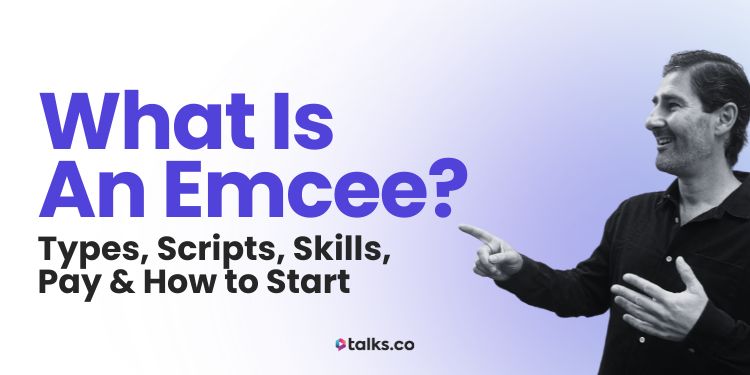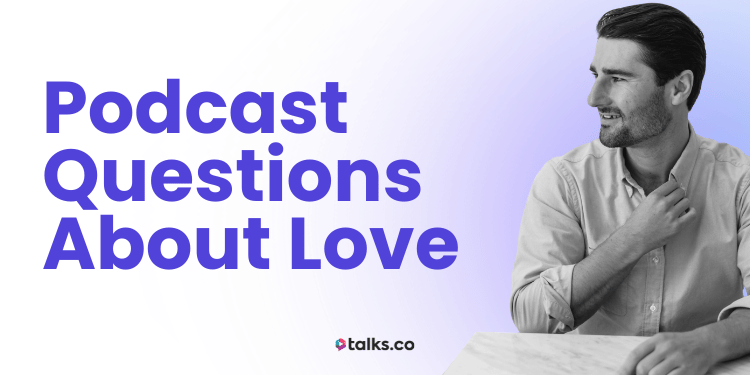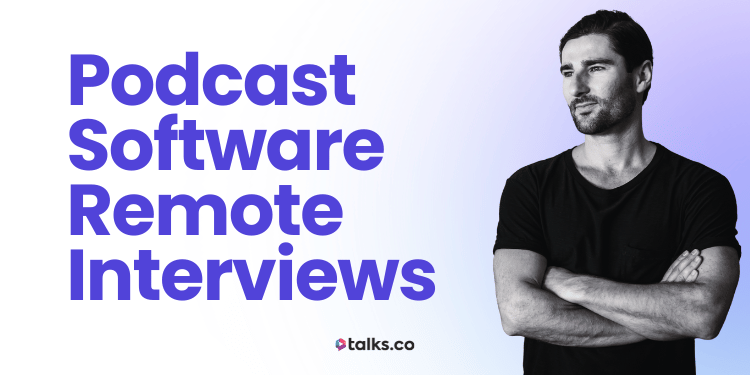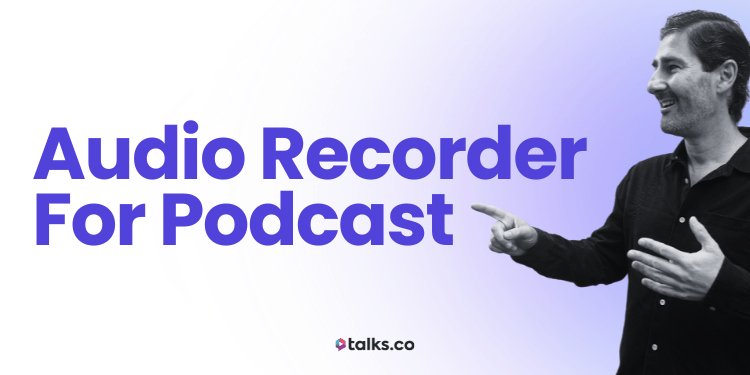What is an emcee? Maybe you saw someone host a panel or podcast and thought, “I could do that.”
Maybe people say you’ve got the voice, the energy, the stage presence.
Or maybe you’ve been hosting for a while and just realized… wait, I’ve been emceeing this whole time.
Either way, you’re in the right place.
In this guide, you’ll get a simple breakdown of what an emcee actually does, where the role shows up (on stage, online, in your business), and how to step into it yourself.
I’ve hosted and guested on 400+ podcast interviews and virtual events and trained others to do the same.
So if you’re building a brand and want to get booked, grow your reach, or lead stronger sessions?
Understanding the emcee role is a smart move.
What Is an Emcee?
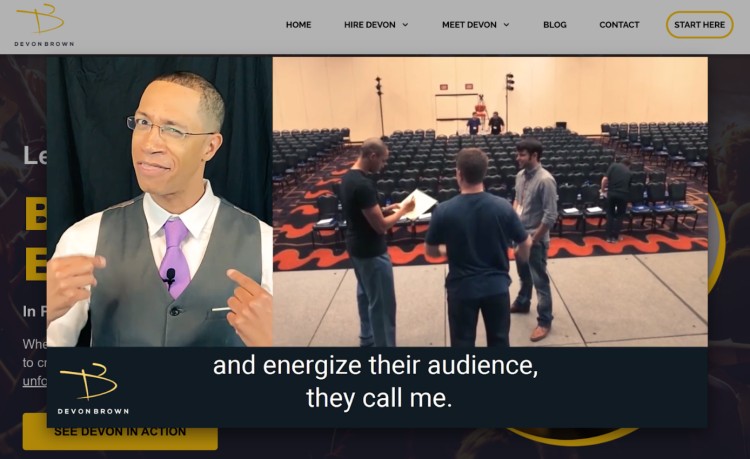
As an emcee, you’re the person who helps event organizers keep things running smoothly. You’re the one holding the mic, introducing the next act or speaker, and keeping the event moving so nothing stalls or drags.
You’re not there to steal the spotlight. You’re there to support the main players and keep your attendees locked in.
The best emcees read the crowd and adjust on the fly, so your event feels natural and alive from start to finish.
Is it MC or Emcee?
You’ve probably seen both, but here’s the clear difference: MC stands for Master of Ceremonies. Emcee is how you say MC out loud.
If you want to sound official, go with MC. But if you want to keep it modern and approachable, emcee works better.
Difference between emcee and MC
There’s no difference in what you do. The job’s the same. It’s just how you say it that changes the vibe.
- MC sounds formal and old-school, something you’d see on a traditional event schedule.
- Emcee feels casual and conversational. You’ll hear it more in podcasts, concerts, and casual events.
Either way, you’re running the show, keeping energy up, and making sure things don’t fall apart.
What does emcee stand for?
Emcee = MC = Master of Ceremonies
This role goes back centuries, starting in formal settings like royal events or religious ceremonies where someone led the gathering.
Today, you’ll find emcees setting the stage everywhere, from weddings to rap battles, podcasts to live shows.
You hold the room together, keep things on track, and make sure everything flows without making it all about you.
Role of an emcee
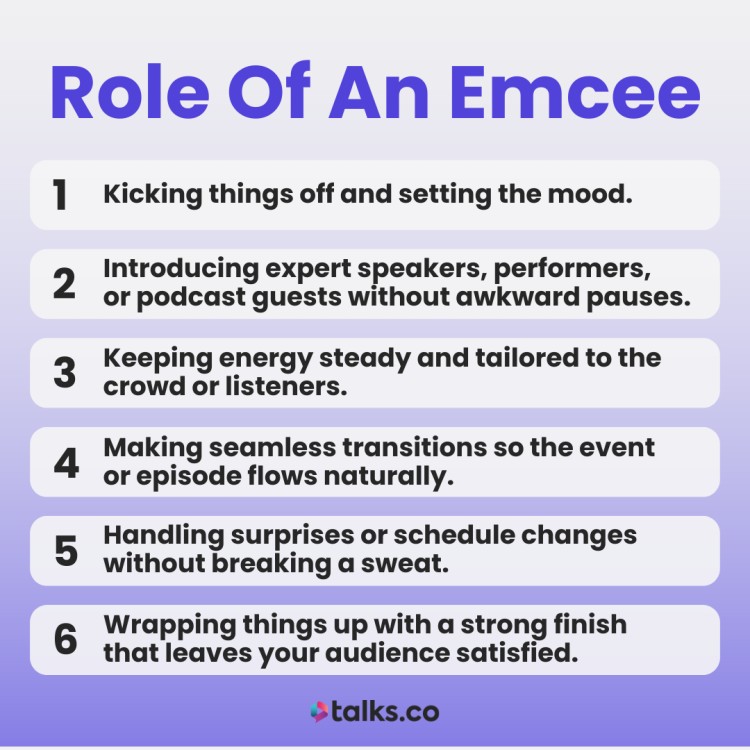
The importance of your job as an emcee is to foster audience interaction and control the pace and energy of the event or show.
Here’s what you’ll be doing:
- Kicking things off and setting the mood.
- Introducing expert speakers, performers, or podcast guests without awkward pauses.
- Keeping energy steady and tailored to the crowd or listeners.
- Making seamless transitions so the event or episode flows naturally.
- Handling surprises or schedule changes without breaking a sweat.
- Wrapping things up with a strong finish that leaves your audience satisfied.
In podcasts, this means cueing guests, managing segment and presentation changes, throwing in some podcast interview questions in case of dead air, and keeping digital listeners engaged from start to end without the visual cues a live event has.
Difference between emcee and host
They’re not the same thing even though some people use the terms interchangeably.
Here’s a quick way to think about the duty and responsibility of each:
- The event host is the friendly face that opens the door and sets the appropriate tone.
- The emcee is the one who commands attention with the mic and keeps the show tight, flowing, and on time.
On different types of podcasts, these roles can overlap or split.
Sometimes the host leads the conversation and engages listeners, while the emcee manages episode flow, intros, outros, and segment transitions. In bigger shows, having both keeps things sharp and professional.
Need both? Hybrid and multi-day events usually benefit from having a host and a dedicated emcee. One to engage, one to execute.
What is an emcee at a wedding?
The wedding emcee is the one keeping the reception on track. Announcing speeches, the first dance, the cake cutting.
DJ Khaled often doubles as the wedding emcee for high-profile events, making sure everything flows and everyone’s having a good time.
This role is strictly in-person, and it’s about keeping energy positive and timing tight without overshadowing the couple.
What Does an Emcee Do?
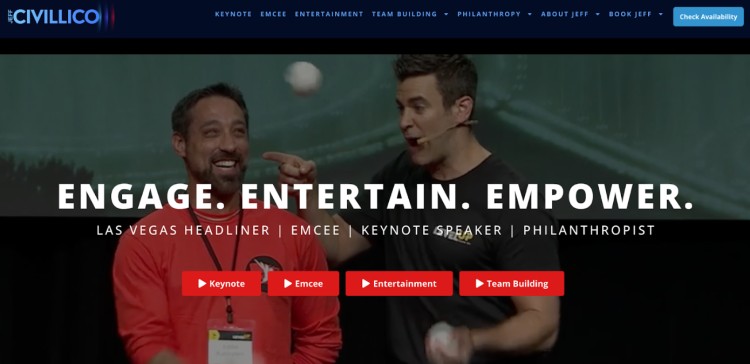
Depends on where you’re showing up.
- At a business summit, the emcee opens strong, keeps speakers on time, handles awkward tech pauses with ease, and makes sure the sponsor shoutouts don’t kill the vibe.
- At a wedding, they’re not just introducing the couple and cueing the first dance. They’re keeping the family drama off-mic and the dance floor packed.
- At a podcast recording, the emcee might be the host, pulling the best stories out of a guest, pacing the conversation so it flows, and landing the call to action without it feeling forced.
- At a virtual event, they’re keeping online attendees from logging off by making things feel live and communication interactive even through a screen.
Different situations, same core job: keep the audience engaged, steer the show, and make the experience feel seamless for everyone else.
What is an emcee in rap?
An emcee in rap is the artist, the storyteller, the hype builder. They’re spitting rhymes live and owning the crowd.
The roots of modern emceeing live in hip-hop culture, where the person on the mic had to engage the crowd live, no script, no safety net.
Artists like Kendrick Lamar and Nas started this way, mastering flow and live connection long before stepping into studio albums or big stages.
How much does an emcee make?
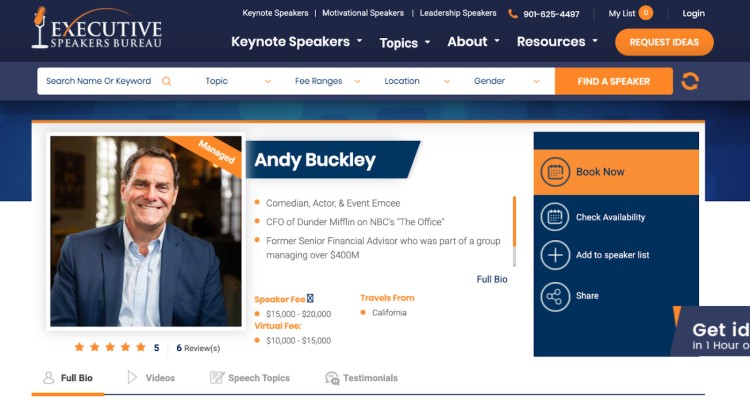
It depends on the event type, your skill, and where you’re based. Here’s a quick snapshot of U.S. rates:
- General emcees: Around $81/hour, $14,000+ per month, or $168,000+ per year
- Formal Masters of Ceremonies: Around $58/hour, $10,000+ per month, or $120,000+ per year
- Top-paying cities: Up to $100/hour, $16,000month, or $195,000/year
Smaller local events pay less. Big corporate or multi-day gigs pay way more. Your reputation and reliability are what set your rate.
What makes a strong emcee?
If you want to get hired and keep getting hired, nail these five quintessential traits of a professional emcee:
- Know exactly when to speak and when to stay quiet.
- Stay cool even when things go sideways.
- Match your tone to the event and audience members.
- Handle personalities with respect and confidence.
- Pay attention to what’s happening, not just your script.
And here are the top five skills and qualities of a successful emcee that separate you from amateurs:
- Improvisation without rambling
- Smooth transitions that don’t kill momentum
- Voice control (tone, pace, projection)
- Command presence without stealing focus
- Experience reading a room in real time
The impact of an emcee on events
A bad emcee can kill the energy and leave guests bored or confused in response. A good emcee makes everything run so well, people barely notice the hard work behind it.
You’re the one who keeps things tight, handles unexpected logistics issues quietly, and leaves a lasting positive impression.
10 Types of Emcees by Event
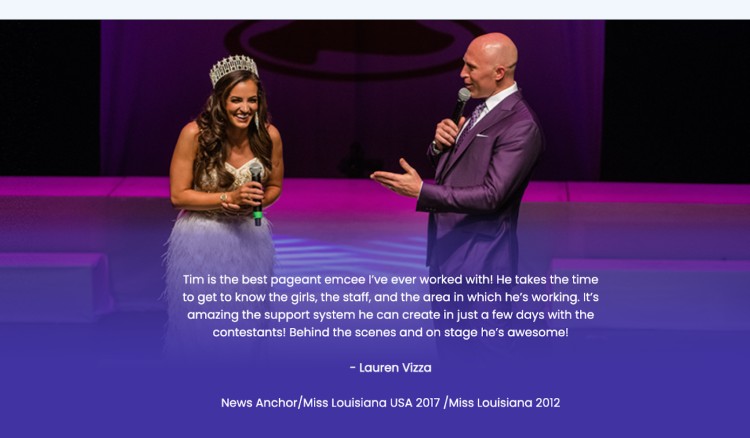
Every event has its own rhythm and your job as the emcee is to match it. Some gigs need hype and crowd work management, others need polish and control.
Here’s a closer look at ten common types, plus what you can learn from real emcees who own these roles.
- Corporate event emcee: You keep the different parts of the agenda tight and blend professionalism with personality. Think Steve Harvey at business summits. Sharp, warm, and always on time.
- Virtual event emcee: Hosts online, juggling tech, chat, and audience engagement. Lisa Nichols keeps virtual crowds energized and connected.
- Concert or festival emcee: Hypes the crowd and fills gaps between acts. Flavor Flav brought this to life with his bold presence and public speaking skills at Public Enemy shows.
- Podcast emcee: Keeps episodes moving, introduces guests, and holds your listeners’ attention. They’re the voice that ties interviews and segments together (a huge part of what makes a good podcast).
- Sports event emcee: Keeps fans and spectators engaged during breaks and contests. Chris Michaels is a staple in NBA arenas, driving fan energy without stealing focus from the game.
- Award show emcee: Manages flow, eases awkward moments, and adds humor. Billy Crystal’s legendary Oscars hosting is the blueprint: funny, classy, and perfectly paced.
- Pageant emcee: Cues contestants and announces winners with calm clarity. Bob Barker’s steady style set the pace for pageants.
- Club or party emcee: Works the mic live, riding crowd energy nonstop. Big Tigger’s instincts kept 106 & Park buzzing and lively.
- Religious or cultural event emcee: Sets respectful tone and introduces leaders. Priya Krishna handles cultural events with warmth.
- Comedy or variety show emcee: Warms up crowds and keeps transitions sharp. Dave Chappelle has done this effortlessly. Funny, loose, and always in control.
How to Become an Emcee
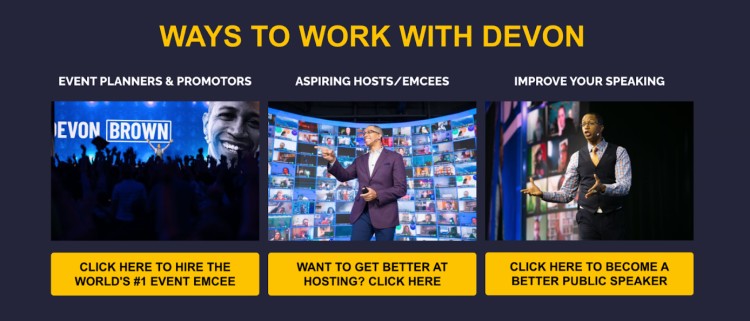
If you want to step up and own the mic, here’s a guide to becoming a successful emcee with clear steps to build your skills and get you in front of any type of crowd you want.
- Learn the role inside out. Watch top emcees. Study their background information, how they pace events, handle awkward moments, and keep energy sharp. This is your foundation.
- Practice relentlessly. Start small. Open mic nights, local events, podcast intros, or guest hosting on shows. The more you do it, the more natural you’ll feel behind any mic.
- Find your style. No one wants a copycat. Find your voice, tone, and energy that fit your personality. Be authentic. That’s what connects with people.
- Master the flow. Know the schedule inside out. Nail transitions without sounding scripted. Learn how to prepare for a podcast interview you’re joining. Make it look easy.
- Write scripts but leave space to improvise. Prepare key lines, but be ready to adapt. Practice delivering with energy and timing.
- Learn to read the room. Adjust your vibe to the crowd. Sometimes hype it up, sometimes pull back. Knowing when to switch sets you apart.
- Network smart. Connect with event planners and venues. Find podcast guests to match you with shows they’ve been on. Start with smaller gigs, build your reputation.
- Keep improving and collecting feedback. Record your shows, get honest feedback, sharpen your craft. The best never stop improving.
How Do You Start an Emcee Speech?
Kick things off with a clear, confident greeting:
“Welcome, I’m [Your Name]. We’ve got a great night ahead. Let’s get started.”
Your job is to own the room from the first line, make it easy for the audience to follow, and keep things tight.
Then jump straight into the first speaker or segment.
What to say when you are an emcee
Use these templates to fit your event. Swap in details and your own style.
- Wedding emcee: “Good [evening/afternoon], everyone. I’m [Your Name], and I’m honored to guide you through [Bride + Groom]’s big day. Tonight’s about celebration, laughter, and making memories.”
- Corporate event emcee: “Welcome to [Event Name]. I’m [Your Name], your emcee. We’ve got a packed schedule with top speakers and networking opportunities. Let’s jump right in.”
- Charity fundraiser emcee: “Hi all, I’m [Your Name]. Thanks for joining us at [Event Name]. Tonight, we come together for a cause that matters [brief mission]. Let’s make an impact.”
- Concert or festival emcee: “What’s up, [City/Location]? I’m [Your Name], and this stage is about to light up. First up, give it up for [Artist/Band Name].”
- Virtual event emcee: “Welcome to [Event Name], live from [Location/Studio]. I’m [Your Name]. Check your Wi-Fi and get ready. Today’s lineup is packed.”
- Rap battle emcee: “It’s time! Welcome to [Event Name]. I’m your host, [Stage Name], ready to see who owns the mic tonight. Let’s get it started with [Rapper’s Name].”
- Podcast emcee: “Welcome back to [Podcast Name]. I’m [Your Name], your emcee, here to keep the conversation rolling. Today’s episode features [Guest Name], so stay tuned for insights you won’t want to miss.”
How to write an emcee script
Here’s how to build your own emcee script from scratch. This works whether you’re doing a formal awards show or hyping up a crowd at a party.
- Know your role. Are you warming up the room, introducing speakers, or keeping the energy up between sets? Start there.
- Learn the event schedule. Get a full rundown of the agenda. Know who’s speaking, when breaks happen, and what needs to be said.
- Personalize your intro. Keep it brief and real. Share something relatable but don’t hog the mic.
- Connect with the crowd. Call out the audience or event. A quick joke or reference makes you relatable.
- Set expectations. Tell people what’s coming and how long it’ll take. Keep it clear and quick.
- Write strong transitions. Write tight intros and outros. Avoid dead air or awkward handoffs.
- Prepare for curveballs. Have a few fallback lines ready in anticipation of delays, tech issues, or unexpected moments. You’re the steady hand.
- Practice it out loud. Run your script like you’ll deliver it. Focus on timing, tone, and energy, not fancy words.
You’ve Got the Mic. Now Own It.
Still wondering what is an emcee?
It’s not just someone who grabs the mic and fills silence. A real emcee runs the show. They set the tone, read the energy, and handle the unexpected without losing the room.
It’s part strategy, part instinct, and all leadership.
If you’re ready to be that person… The one event hosts rely on to keep things tight and on track?
Then let your profile prove it.
Create your free Talks creator profile and show them exactly why you’re built for the spotlight.
